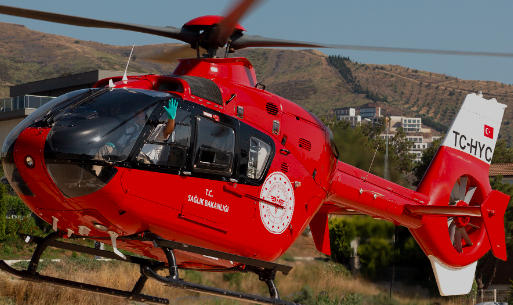
Turkey, with its rich history, diverse landscapes, and growing economy, has become a hub for various industries, including aviation. The demand for helicopter pilots in Turkey has seen a steady increase due to the expansion of sectors like tourism, oil and gas exploration, emergency medical services, and law enforcement.
1. The Growing Demand for Helicopter Pilots in Turkey
a. Tourism Industry
Turkey, with its stunning landscapes and historical sites, attracts millions of tourists annually. Helicopter tours have become increasingly popular for tourists seeking a unique perspective of the country. As a result, there is a rising demand for skilled helicopter pilots to cater to this niche in the tourism sector.
b. Oil and Gas Exploration
Turkey has been actively exploring and exploiting its natural resources, including oil and gas. Helicopters play a crucial role in supporting these operations by transporting personnel and equipment to offshore platforms. This creates a demand for pilots with specific skills in offshore operations.
c. Emergency Medical Services (EMS)
Helicopters are vital in providing emergency medical services, especially in remote or difficult-to-reach areas. The need for helicopter pilots to support EMS operations is evident, and the demand is expected to grow as the healthcare infrastructure continues to develop.
d. Law Enforcement and Security
Helicopters are indispensable in law enforcement, border control, and security operations. Surveillance, search and rescue missions, and transportation of personnel are among the tasks where helicopters are crucial. This opens up job opportunities for pilots with a focus on security and law enforcement.
2. Qualifications Required for Helicopter Pilots in Turkey
a. Licensing and Certification
To become a helicopter pilot in Turkey, individuals must undergo rigorous training and obtain the necessary licenses and certifications. The Turkish Directorate General of Civil Aviation (DGCA) sets the standards for pilot training and issues licenses upon successful completion of the required courses.
b. Educational Background
A strong educational background in aviation, aeronautical engineering, or a related field is often preferred. Many helicopter pilots in Turkey have degrees from aviation schools or universities specializing in aviation studies.
c. Flight Experience
Flight hours are a crucial factor in a helicopter pilot’s qualifications. Employers often seek candidates with a significant number of flight hours, and some positions may require specific experience, such as flying in challenging weather conditions or mountainous terrain.
3. The Aviation Industry in Turkey
a. Regulatory Framework
The Turkish Directorate General of Civil Aviation (DGCA) is the regulatory authority responsible for overseeing civil aviation in the country. It establishes and enforces regulations, ensuring the safety and efficiency of air transportation.
b. Training Facilities
Turkey boasts several reputable flight schools and training facilities that provide comprehensive training for aspiring helicopter pilots. These institutions adhere to international standards, contributing to the production of highly skilled pilots.
c. Aircraft Fleet
The aviation industry in Turkey has a diverse fleet of helicopters catering to different purposes. From small, versatile helicopters for tourism to larger, specialized models for offshore operations, the industry offers a range of opportunities for helicopter pilots.
4. Career Path for Helicopter Pilots in Turkey
a. Entry-Level Positions
Newly licensed helicopter pilots often start their careers in entry-level positions, gaining experience and building flight hours. These positions may include roles in tourism, flight instruction, or entry-level positions within companies operating helicopters.
b. Specialized Roles
As pilots accumulate flight hours and experience, they may have the opportunity to move into specialized roles. This could involve working in oil and gas exploration, emergency medical services, or law enforcement, depending on their interests and qualifications.
c. Advancement Opportunities
Helicopter pilots in Turkey can advance in their careers through continuous training, gaining additional certifications, and accruing more flight hours. Advancement may lead to positions such as chief pilot, director of operations, or other managerial roles within aviation companies.
5. Challenges and Considerations
a. Competitive Nature of the Industry
The aviation industry is highly competitive, and securing a helicopter pilot position may require persistence and networking. Building a strong professional network within the aviation community in Turkey can enhance job prospects.
b. Regulatory Compliance
Staying updated with the latest regulations and complying with safety standards set by the DGCA is paramount. Pilots must undergo recurrent training and maintain their licenses to ensure they meet the regulatory requirements.
c. Adaptability to Changing Technologies
Advancements in helicopter technology and aviation systems require pilots to stay abreast of new developments. Continuous learning and adaptability to evolving technologies are essential for a successful and sustainable career.
Conclusion
In conclusion, the helicopter pilot job opportunities in Turkey are diverse and promising, driven by the growth of industries such as tourism, oil and gas, emergency services, and security. Aspiring pilots must undergo rigorous training, accumulate flight hours, and stay updated with industry trends to navigate the competitive landscape successfully. The dynamic nature of the aviation sector in Turkey presents a range of career paths, from entry-level positions to specialized roles, offering fulfilling opportunities for those passionate about aviation.





